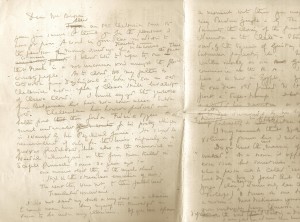 Found in a pile of papers around a year ago at Jot HQ is this draft of a barely decipherable ( hence the gaps and possible misreadings of words ) and incomplete letter written in pencil on the back of a typed Roneoed page headed ‘ The Association of British Chambers of Commerce/5thOctober, 1942/Parliamentary Bulletin No 462A/Information by question and answer. The draft letter is addressed to ( Ivor ) Brown, author of A Word in your Ear( 1942), a book that explores the history of certain words. The writer cannot be identified from any clues in the letter , though what clues there are might open up paths for Jot fans who are familiar with Cheltenham and the Cotswolds. Any with information are welcome to write in.
Found in a pile of papers around a year ago at Jot HQ is this draft of a barely decipherable ( hence the gaps and possible misreadings of words ) and incomplete letter written in pencil on the back of a typed Roneoed page headed ‘ The Association of British Chambers of Commerce/5thOctober, 1942/Parliamentary Bulletin No 462A/Information by question and answer. The draft letter is addressed to ( Ivor ) Brown, author of A Word in your Ear( 1942), a book that explores the history of certain words. The writer cannot be identified from any clues in the letter , though what clues there are might open up paths for Jot fans who are familiar with Cheltenham and the Cotswolds. Any with information are welcome to write in.
Dear Mr Brown,
Allow one old Cheltonian some 15 years your senior to thank you for the pleasure I have got from A Word in your Ear in addition to the pleasure from many similar examples of lexical intercourse. There is much I should like to refer to, one; the fact that Nesh is a not uncommon word amongst the poor country people. As to clout too, my father, a Cotswolder from Daglingworth & like my son, an old Cheltonian , never spoke of Cleeve Hill, but always of Cleeve Court. I much enjoyed the quotation from Betjeman, but have never come across Silver ( ? ). Cheltenham has however produced one fellow poet ( ).Frederick Myers is much underrated for his poetry which is swamped by his Psychical fame. It should be remembered, if only for the lines originally on a grave at Grindelwald , but also on the memorial in Wasdale churchyard on the four men killed on Scafell Pinnacle some 30 years ago:-
On moment stood they as the angels stand
High in the stainless imminence of air;
The next they were not, to their fatherland
Translated unaware.
I do not see my book & my son’s as a classic to rank near him, being myself too ( ? ) in verse to be under any illusion. If you can spare a moment with them you may amused by my ( ? ) jingle & by The Dear Inn, which laments the closing of the great coaching inn above Naunton on the Cheltn. – Stow road, done, so it was said, by the squire of Guiting, who disliked his farm labourers frequenting it. My son’s little book was written originally as a Gunner before he got his commission in the R.A. He was my partner here & is now in Egypt. You may like my poem to our dear old friend W. H. Davies, the Welsh poet & ‘Super-tramp’. (I had to do most of his affairs & attended his cremation) as we saw him so often sitting surrounded by his beloved pictures– mainly portraits of himself & his magnificent Epstein hair.
Continue reading


